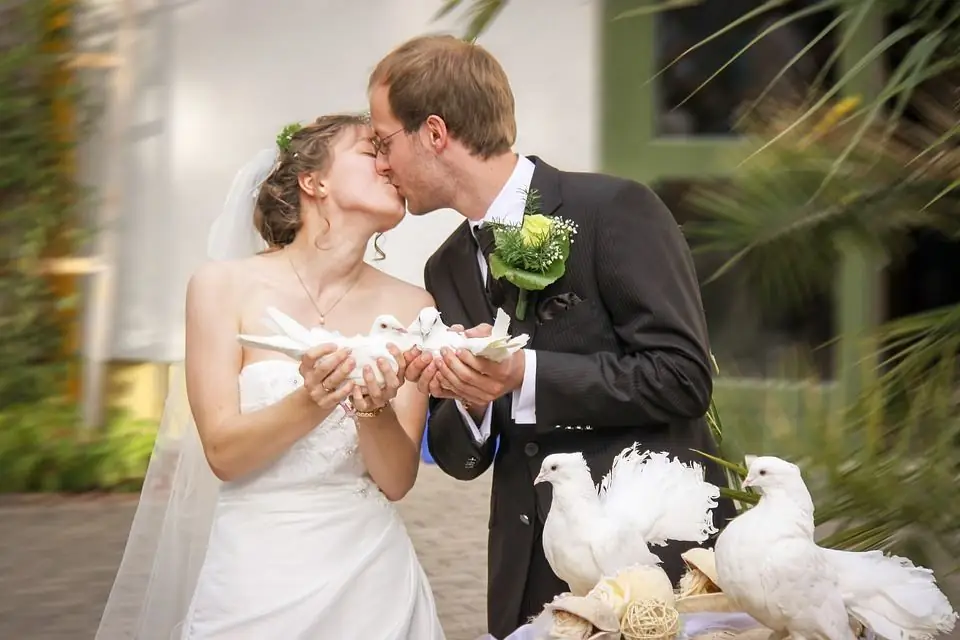2026 Author: Priscilla Miln | miln@babymagazinclub.com. Last modified: 2025-01-22 17:55:13
Most people in everyday life do not think about the forms of placement of orphans. It seems to us that all adopted children are in approximately the same position and status. However, it is not. When future adoptive parents begin to deal with the legal side of the issue, they are faced with various subtleties and features of the arrangement of each individual child. What are the ways to adopt a child? What are their advantages and disadvantages? Is there a difference - guardianship, foster family and patronage?
A child in an orphanage
Despite the fact that all children in the orphanage actually live and are brought up together, they are often in different status. Some kids are orphans, others are left without parental care. Is there a difference between these definitions for potential guardians?
Orphans are children who have lost both orsingle parent and left without adult care. Children left without parental care are not always orphans. Their parents tend to be evasive, incarcerated, deprived of parental rights, or reported missing.

From a legal point of view, the law makes no distinction between orphans and children left without parental care. In fact, children can be in a shelter with different status, which regulates their relationship with potential future parents or caregivers.
What are the forms of child care?
Today, there are 4 forms of adopting a child from an orphanage. All of them differ in the level of responsibility, the status of adults responsible for the child, as well as the rights of newly-made and biological parents.

An orphan can be adopted (adopted), taken under patronage, guardianship and in a foster family. Each of these forms has its own advantages and disadvantages and can often be a transitional option for a child who is in the process of obtaining a new status.
Adoption, guardianship, foster family - what is the difference between these definitions?
As a blood child
The priority form of placing a child in a family is adoption. This form is established only by decision of the civil court. After the adoption of the child in the family, he receives all the rights of blood relatives, for example, the right to inheritance. Parents, in turn,bear full responsibility for his life and he alth.

Adoption, unlike foster care and guardianship, allows parents to change the name, surname, patronymic of the child, as well as the date and place of his birth. The secrecy of adoption is protected by law, and people who violate it may be subject to criminal and civil liability.
Control of the child's stay in a new family is carried out during the first three years after the court order with the obligatory condition of secrecy.
Expectant parents must meet certain government requirements. For example, they must not have a disability of group I, tuberculosis, malignant tumors, a conviction for an attempt on the life, he alth or honor of a person, be incapacitated or persons without a fixed place of residence.
Guardation
Sometimes it happens that a child is in a status that does not allow adoption or adoption. In this case, he can be taken under guardianship. In this case, the parents take the child into the family as a foster child. For children under 14, this form of arrangement is called custody, for children from 14 to 18 - guardianship.

Upon reaching the age of majority, such a child who does not have his own housing has the right to receive an apartment from the state.
Despite the apparent advantages, guardianship has a number of disadvantages:
- Constant monitoring by guardianship authorities.
- The lack of secrecy of adoption and the possibilitycontacts with blood relatives.
- When an applicant for adoption appears, the child can be taken away from the family.
- Inability to change the baby's name, surname and other data.
At the request of the guardians, the guardianship and guardianship authorities appoint a one-time or monthly payment received from income from the property of a minor or from the local budget. The guardian also receives child support.
Today in Russia there are two forms of paid guardianship - patronage and foster family.
Contract Parenting
When a child cannot be placed under guardianship or for adoption, he is placed in a foster family. The difference between foster care and foster care is small, but it does exist.

A foster family is a form of adopting a child, in which upbringing is carried out under an agreement between the family and the guardianship and guardianship authorities. The main difference between a foster family and guardianship and adoption is that the parent-caregiver receives not only the allowance for the maintenance of the child, but also wages. In addition to everything, he is credited with seniority. The term of guardianship in such cases is prescribed in the contract and may vary. Practice shows that it is usually concluded before the child's 18th birthday.
Another difference between guardianship and foster care is that the latter form of arrangement involves more control from the guardianship authorities. This is expressed not only in financial statements, but also in the control of the educational process.
Both guardians and adoptive parents representativeguardianship visits the first five years.
Patronage
Patronage is one of the forms of temporary paid guardianship introduced in Russia in 2008. Is there a difference for parents - guardianship, foster family and patronage? Yes, and a significant one at that.
If the main difference between a foster family and guardianship is the difference in payments, then patronage is, first of all, a temporary device for a child left without parental care. He not only retains the right to communicate with blood relatives: such communication is mandatory and prescribed and regulated in a tripartite agreement.
A foster family is not relatives, but rather educators who take a child for a while and are obliged to fulfill the plan of the guardianship authorities, reporting on the work done and the money spent.
Which form of device to choose?
Studies in the field of child psychology show that any family is better for a child than an orphanage. Deprivation of children in state institutions leaves an indelible imprint on their personality, further relationships with people and socialization.

For people who decide to adopt a child into a family, it is worth choosing which form of device is better. The most reliable and at the same time the most time-consuming is adoption (adoption). The requirements for adoptive parents are the most stringent. Immediately after the court decision, full responsibility for the life and he alth of the child passes to the parents. Such parents do not receive benefits and payments, but they are protected by law as much as possible: this includesnot only the secret of adoption, but also the restoration of the rights of blood relatives.
The simplest form of device is guardianship. Preference in choosing a guardian is given to the child's relatives or family friends. If these are not available, other device options are considered. The guardian receives a social allowance for maintenance. If applicants for adoption appear, the child may be taken away from the guardian's family.
The difference between the forms of guardianship and the foster family is not only in the amount of money that the guardian-educator receives, but also in reporting to the guardianship and guardianship authorities. Applicants for a foster family are selected more carefully, and the requirements for them are more stringent. As in the case of guardianship, there is no kinship between foster children and guardians and any relationship ends when the child reaches the age of majority.
Patronage is a form of temporary adoption of a child's caregivers into the family.
Requirements for guardians and adoptive parents
While almost all people can have a natural child, regardless of the presence of problems with alcohol, drugs, he alth or housing, the requirements for guardians and adoptive parents are quite high.

People who want to adopt a baby or take him into custody must be capable, they should not be limited in parental rights or deprived of them. Future parents must have sufficient living space (at least 12 square meters per person) and income sufficient to provide the child with a livingminimum.
Furthermore, people suffering from tuberculosis, having a disability of the 1st degree or malignant tumors, patients with infectious diseases before remission and people who are in same-sex marriage cannot be adoptive parents.
The basis for a refusal may be a conviction under articles for crimes committed against the he alth, life, dignity and honor of a person.
All prospective adoptive parents are required to complete the School of Foster Parenting and obtain the relevant document before applying for adoption.
International guardianship and adoption
According to the law of the Russian Federation, citizens of the United States, as well as those countries that allow same-sex marriages, cannot become adoptive parents and guardians.
For the rest, the requirements for foreign citizens are the same as for Russians.
Recommended:
The rights and obligations of spouses arise from the date of registration. Family Code and Legal Advice

On the day of the legal creation of a family, the newlyweds take on new obligations - not only of a personal nature, but also legal ones. The obligations acquired in the legal consolidation of the relationship must be known to the couple, since ignorance does not exempt from fulfillment. Given the many facets of family relationships and guided by the basic principles prescribed by law, it is possible to build a strong and happy family
Family as a social group and social institution. The role of the family and family problems in society

Family is the most important social institution. Many specialists are concerned about this topic, so they are diligently engaged in its research. Further in the article we will consider this definition in more detail, we will find out the functions and goals set by the state in front of the "cell of society". The classification and characteristics of the main types will also be given below. Consider also the basic elements of the family and the role of the social group in society
Family. Family definition. Large family - definition

In our world, the definition of "family" in the life of every person is ambiguous. Of course, first of all, it is a great source of energy. And a person who tries to separate from it is most likely doomed to failure. In practice, no matter how tired our relatives are, if something happens, they will be the very first to come to the rescue, share your failures and help out if necessary
Foster education is Definition of the concept, differences from other forms

Foster care is a form of placement of orphans, which involves the presence of a guardian in the family. The child begins to master the techniques of communication, learns to recognize his own and other people's emotions. A person who has reached the age of majority, who has a desire to engage in the education of children and their socialization, can become a trustee. Permission to carry out patronage activities must be issued by employees of guardianship and guardianship
The meaning of the family in human life. Children in the family. Family traditions

Family is not just a cell of society, as they say. This is a small “state” with its own charter, the most important thing in life that a person has. Let's talk about its value and much more

